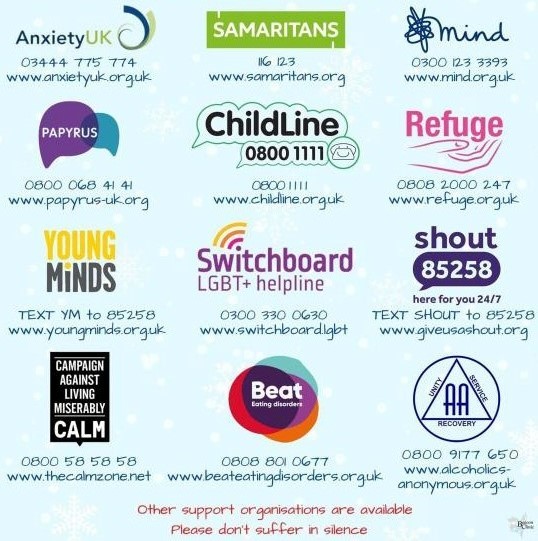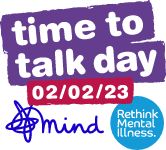It’s Time to Talk Day on Thursday 2 February 2023
Time to Talk Day is run by Mind and Rethink Mental Illness in England. The day is all about creating supportive communities by having conversations with family, friends, or teachers about mental health. We all have mental health, by talking about it we can support ourselves and others. Time to Talk Day was launched in 2014 by Time to Change, a campaign to end mental health stigma and discrimination, which was run by Mind and Rethink Mental Illness.
So, why is there a whole day dedicated to talking about mental health?
One in 4 of us will experience a mental health problem in any given year
One thing is certain, we are all born with feelings – both positive and negative and such feelings can sometimes be unavoidable. Conversations about mental health have the power to change lives. Talking about mental health:
- Reduces stigma
- Helps us make new friends and connect with our communities
- Helps us to feel empowered to seek help when we need it
- Helps others, which makes us feel good as it gives us a sense of belonging
Listening
What about if you’re the one someone else wants to talk to? When it comes to listening, you can always ask someone how they are, but try to really listen to the response. This is called active listening and is a good skill to master. On average humans are able to actively listen to 125 to 250 words a minute. So how do we actively listen? Watch the clip below to see what bad listening looks like
so now we have seen what bad listening looks like, watch the next clip for some good tips for active listening.
‘What if I can’t help? What if I don’t have the answers to their problems?’. Most of the time, if someone is talking to you about their worries, all they want is someone to listen and to be able to voice their thoughts, not to be given the answers. It’s about accepting people and making them feel as comfortable as possible with whatever problems they have. Being more conscious of our feelings and serious about removing the stigma can give us the strength to begin those sometimes ‘awkward’ conversations. You may find that these conversations aren’t actually awkward or daunting… it is just your thoughts!
Remember, Time to Talk Day is about us all being open to the idea of talking – we all have mental health, and by having conversations about it we can help ourselves and others. It’s not about encouraging people to talk about a mental health problem if they don’t want to or aren’t quite ready. If someone does open up about their mental health, it might not always feel easy to know what to say. But it doesn’t have to be awkward and being there for someone can make a big difference. There is no right or wrong way to do this, and these tips can help you make sure you are approaching it in a supportive way:
Ask questions and listen
Asking questions can give the person space to express how they’re feeling and what they’re going through, and it will help you to understand their experience better. Try to ask questions that are open and not leading or judgmental, like “how does that affect you?” or “what does it feel like?”
Think about the time and place
Sometimes it’s easier to talk side by side rather than face to face. So, if you do talk in person, you might want to chat while you are doing something else. You could start a conversation when you’re walking, cooking or stuck in traffic. However, don’t let the search for the perfect place put you off!
Don't try and fix it
It can be hard to see someone you care about having a difficult time but try to resist the urge to offer quick fixes to what they’re going through. Learning to manage or recover from a mental health problem can be a long journey, and they’ve likely already considered lots of different tools and strategies. Just talking can be really powerful, so unless they’ve asked for advice directly, it might be best just to listen.
Treat them the same
When someone has a mental health problem, they’re still the same person as they were before. And that means when a friend or loved one opens up about mental health, they don’t want to be treated any differently. If you want to support them, keep it simple. Do the things you’d normally do.
Be patient
No matter how hard you try, some people might not be ready to talk about what they’re going through. That’s ok – the fact that you’ve tried to talk to them about it may make it easier for them to open up another time.
“Shine bright, mental health is a continuum, you are in this place temporarily. Remember to prioritise your mental health as you would your physical health.”
written by Emma Marshall School Nurse
What if someone insists that they are fine, but something just doesn’t seem right? You might be questioning how we know if someone is struggling. There are signs that might mean someone is having a hard time. As well as feeling sad or down, any change in behaviour could be a sign, things to look out for could include

There are lots of things you can do to support people even if they don’t want to talk
- Find things in your community to get involved in together
- Sending a text to let them know you’re thinking of them
- Offering to help with day-to-day tasks
People experiencing mental health problems may need some extra support following a conversation, as sensitive conversations may bring up difficult things. There are lots of places to which you can go or direct people for help. For further support for your mental health visit our mental health page
As well as talking to friends and family, you may want to talk to someone different such as your school nurse. This will help you see you are not alone, and people are there to help you! You can contact your school nurse via the Chat Health page
If you are worried about what someone has said to you please share this with a trusted adult such as your parent or teachers and they will be able to support you to do the right thing.

We all need to unwind, unload, and let our thoughts and feelings out – feel your shoulders go down, the weight on your shoulders lift and the smile on your face rise. Why not try this guided relaxation from the NHS in the video below. Calming breathing techniques for stress, anxiety and panic attacks take just a few minutes and can be done anywhere and used for lots of different things such as exam stress, feeling overwhelmed or dealing with new situations.



Recent Comments